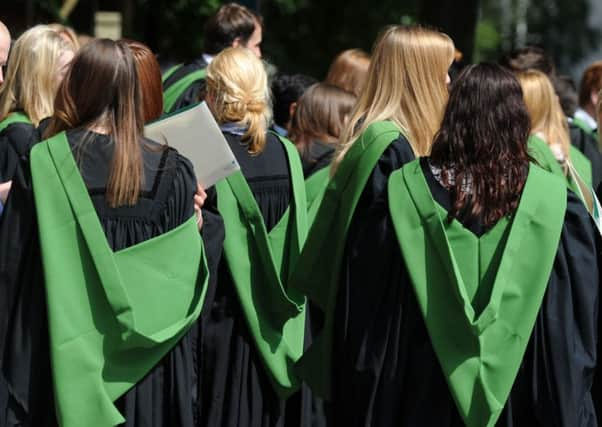Stuart Andrew: Our universities are key to growth of region's cities


I was honoured to host an event at the House of Commons to celebrate one of Yorkshire’s newest universities, Leeds Trinity; an institution that received university status in 2012 but whose heritage traces back to 1966, when it was established as two teacher training colleges in Horsforth; my constituency, in Leeds. During the institution’s 50th anniversary year, it seemed pertinent to reflect on the ten universities across our region and the important role they play in Yorkshire.
With three universities in Leeds, comprising more than 50,000 students and 11,500 staff, it’s perhaps no surprise that the economic contribution to the city is huge. University of Leeds, Leeds Beckett and Leeds Trinity alone contribute almost £1.9bn to the local economy, every year. They also support more than 16,000 jobs in the Yorkshire and Humber region, and for every £1m of revenue generated by the University of Leeds, there will be a further economic impact of £1.31m in the UK.
Advertisement
Hide AdAdvertisement
Hide AdThe University of York contributes 7,845 jobs to the local economy which is roughly 8.4 per cent of the city’s estimated total of 93,890 jobs – real proof of the impact universities can have on some of our region’s smaller cities. The University of Bradford carries out 200 projects per year with businesses from Bradford, the Yorkshire region and beyond.
With graduates statistically earning more money than those who go straight into the world of work, universities improve career prospects, develop knowledge and expertise, and encourage individuals to pursue careers they are passionate about. In the last five years at Sheffield Hallam for example, more than 18,500 students from the region have studied at the institution – with 2,750 training as nurses and midwives; over 2,700 training as teachers; and 1,500 training in creative and digital skills.
After I left school, I had a keen interest in fundraising and volunteering, so I joined the British Heart Foundation and gained valuable experience in the sector. Most universities offer professional work placements with degrees and Leeds Trinity was one of the first to offer this with every single degree in the 1980s. I was pleased to be able to have a student undertake a six week placement in my constituency office last year, where they were able to contribute to running events and responding to constituents.
Encouraging students and recent graduates to set up businesses is something I’m also very proud to support at universities. Leeds Trinity’s undergraduate Business course was ranked the 4th highest-earning course in the 2017 The Times and Sunday Times Good University Guide – a result of recent graduate Ben Lawton establishing his own business, Custom Controllers UK Ltd, in Leeds city centre. Mr Lawton established the UK’s leading manufacturing business for customised gaming controllers during his studies at Leeds Trinity – and although founded in Manchester, he moved the business to Leeds after graduating. He employs 25 local people, including 20 graduates from Leeds universities, and works with local suppliers, including a print studio and packaging company.
Advertisement
Hide AdAdvertisement
Hide AdAs well as supporting economic growth, the region’s Russell Group universities are also improving the quality of life and health of others through lifesaving research. And our newer post-1992 universities are conducting ground-breaking research and offering research degrees.
Growing up on a council estate, I’m also passionate about social mobility, and believe that all universities play an important role in the movement of individuals between social societies. For example, 49 per cent of Sheffield Hallam’s 31,500 students come from within 25 miles of the city – and predominantly areas with low levels of educational attainment and skills.
Guided by its Catholic faith foundation, Leeds Trinity University’s mission now – as it was in 1966 – is ‘to provide an exceptional educational experience in a diverse community, focused on opportunities for young people from poorer families with a mission to actively support social justice’.
They are proud to welcome students from all faiths and backgrounds, and actively recruit young people from disadvantaged backgrounds.
Advertisement
Hide AdAdvertisement
Hide AdAs vice-chairman of the Conservative Party, responsible for cities, I am passionate about developing cities such as Leeds, Sheffield, York, Bradford and Hull as much as possible – and graduates,are absolutely key to enhancing and growing cities in our region.
• Stuart Andrew is the local MP for Pudsey, Horsforth and Aireborough. Find out more about Leeds Trinity’s 50th Anniversary at leedstrinity50.co.uk.